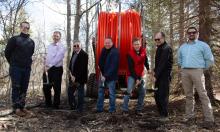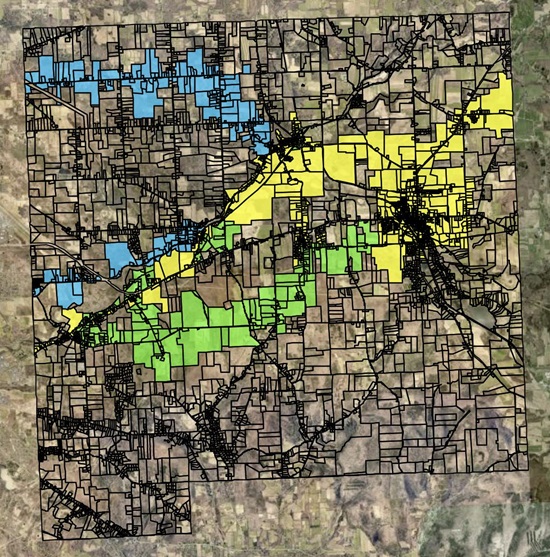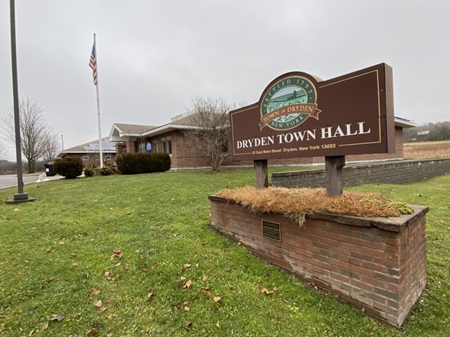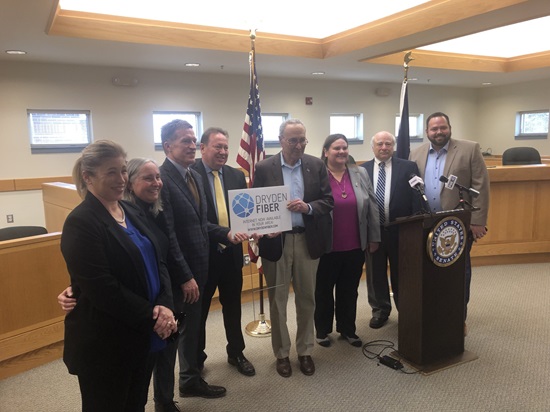
One year after launching a municipal fiber network, Dryden, NY officials say they’re making steady progress in their quest to expand affordable fiber broadband to the entire town of 14,500.
While the effort hasn’t been without obstacles, town leaders say the public response to their foray into broadband has been overwhelmingly positive.
“While there are challenges, we are continuing to make great progress in the buildout,” Dryden Town Supervisor Jason Leifer tells ILSR. “We have support from our residents, who continue to show interest in this project. We also have financial support from Tompkins County in the form of grants–and from neighboring municipalities who are interested in replicating our model.”
The city’s network began with a 50-home trial pilot trial in the southwest part of town. The broader $15 million network will be funded by a combination of bonds, $2 million in federal COVID-19 disaster relief funding, an Appalachian Regional Commission grant, and eventually, subscriber revenues.

The town took a phased approach to deployment, first by connecting the backbone of the network in the southeast of the city, followed by a focus on the western and eastern halves of the municipality, respectively. The Dryden fiber website features a build map that helps locals track network progress.
“We have currently passed over 420 addresses with our buildout,” freshly-appointed Dryden Fiber Executive Director David Makar tells ISLR. “This includes over 150 rental properties – mostly single family homes and apartments – as well as many owner occupied homes and businesses. We are still in phase one, and as we move into the village of Dryden and the hamlets of Varna, Ellis Hollow, and Etna, we will be in phase two.”
There’s currently 6,420 housing units and an estimated 200 businesses operating in the town. Officials say Dryden Fiber currently has 32 paying customers with another 9 in the queue for installation, with progress slowed slightly by some difficulty getting access to rental properties (more on that below).
“Demand is high but a lot of the pent-up demand is either with renters or in areas where we aren't able to serve yet because our infrastructure is not installed where these potential customers reside,” Leifer said. “We are doing our best to work through these challenges.”
As the the Dryden Fiber website notes, locals in range of the network have access to fiber broadband at three speed tiers: symmetrical 400 Megabits per second (Mbps) for $45 a month, symmetrical 700 Mbps for $75 a month, and symmetrical gigabit broadband service for $90 a month.
Dryden’s broadband pricing options are a dramatic improvement from the area’s regional cable monopoly Charter Communications, whose Spectrum-branded service enjoys a monopoly across vast swath of upstate New York, leaving consumers saddled with high prices, spotty coverage, slow speeds, and some of the worst customer service of any company in America.
Landlords And Monopolies: A Potent Combination
The most time consuming aspect of deployment so far has been utility pole make-ready work, and negotiating with landlords to install new service. Regional monopolies like Charter have long struck cozy deals with landlords that sometimes either ban competitors outright, or ban competing ISPs from being able to advertise to building residents.

“The challenge with serving renters is one of access to the property,” Leifer noted. “Incumbent cable companies have an inherent advantage under NY State law (Public Service Law 228) to service renters because they do not need to obtain permission–in the form of easements or licenses–from the property owner to install service to tenants. ISPs like Dryden Fiber who do not offer television service do not benefit from this law.”
Federal regulators have regularly found themselves one step behind the problem. While the FCC enacted rules in 2008 designed to tackle such building-by-building monopolies, the rules were too loophole-filled to prove useful. The FCC took steps in 2022 to shore up the rules, but loopholes remain and enforcement has been inconsistent.
“Current FCC rules do not address this issue because while they prohibit property owners from mandating that their tenants use one service provider these same rules do not require property owners to give access to ISPs when their renters want service from a provider who is not also a cable TV provider,” Leifer noted.
Communities Bond Together To Get The Job Done
The Dryden network’s conception was rooted, like many community broadband networks, with longstanding frustration at the high cost and spotty coverage of monopoly broadband service. A town survey in 2019 found widespread dissatisfaction with Charter, and that 90 percent of locals would support the town building its own community-owned alternative.
“The genesis of Dryden Fiber was directly rooted in our unsuccessful negotiations in 2018 with Charter Spectrum for more buildout in Dryden,” Leifer told ISLR last year. “Even in 2018 we knew that there were areas of the town that were not served by any provider despite the commercial providers and FCC maps showing that service in these areas.”

Charter’s performance in New York had historically been so abysmal, state officials threatened to kick the cable giant out of the state in 2018 after it failed to adhere to merger conditions affixed to the company’s acquisition of Time Warner Cable’s networks in the state.
During the height of COVID lockdowns in 2021, New York state leaders tried to force ISPs to provide low-income residents with discounted $15 broadband tiers, but ISPs like Charter quickly and successfully sued to overturn the effort, arguing such “rate regulation” was preempted by federal law.
So instead, New York has taken aim at competition and affordability, block by block. Dryden’s ambitious effort has inspired a number of additional communities across Tompkins County to explore building their own networks. Collectively, they’re exploring any and all financing options to ensure equitable, affordable, and even broadband coverage.
“We’re just putting the finishing touches on our application to New York State's ConnectALL – Municipal Infrastructure Program which has $228M in funding for broadband projects across NY State,” Makar said. “We are applying in coordination with the Town of Caroline – our municipal neighbor to the immediate south – on a $6 million grant to build out the network in both the Town of Dryden and the Town of Caroline. With these funds, we will be able to reach 100% of the currently defined FCC unserved locations in both the Town of Caroline and the Town of Dryden.”
Header image courtesy of Dryden Fiber
Inline images and map, including image of Sen. Chuck Schumer holding Dryden Fiber sign, courtesy of Dryden Fiber







